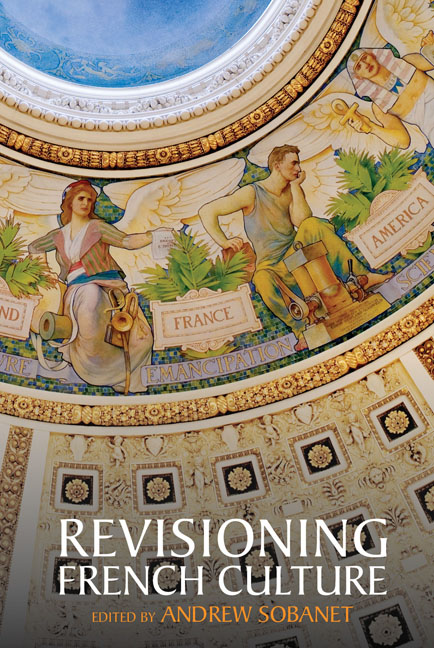Book contents
- Frontmatter
- Contents
- Introduction
- I France in Perspective: The Hexagon, Francophonie, Europe
- II Visions of the World Wars, or L’Histoire avec sa grande hache
- III Refractions and Reflections
- IV French Literature, Revisioned
- V The Subject in Focus
- VI Philosophical Lenses
- VII Coda
- Contributors
- Acknowledgments
- Index
Introduction
- Frontmatter
- Contents
- Introduction
- I France in Perspective: The Hexagon, Francophonie, Europe
- II Visions of the World Wars, or L’Histoire avec sa grande hache
- III Refractions and Reflections
- IV French Literature, Revisioned
- V The Subject in Focus
- VI Philosophical Lenses
- VII Coda
- Contributors
- Acknowledgments
- Index
Summary
France and America, represented by human figures, are seated alongside each other in Edwin Blashfield's iconic mural, The Evolution of Civilization (1897). Those avatars, and ten others, circumscribe the domed ceiling of the Main Reading Room of the Jefferson Building at the Library of Congress in Washington, D.C. Each figure in Blashfield's work is doubly allegorical, representing not just an epoch, civilization, or country but also a specific contribution to the evolution of the West. Egypt brings Written Records, Greece confers Philosophy, the Middle Ages contribute the Modern Languages, and Judea's gift is Religion. The juxtaposition of France (Emancipation) and America (Science) underscores the interdependence of liberty and intellectual inquiry, while at the same time evoking the two countries’ long-standing diplomatic relationship and shared cultural affinities. Beneath those dozen allegorical figures are statues representing Art, Commerce, History, Law, Philosophy, Poetry, Religion, and Science, and below them—but still towering over library patrons—are the likenesses of Moses, Homer, Plato, Michelangelo, and Shakespeare, among many others.
As an ensemble, the Reading Room presents a complex vision of the West's principles, values, and intellectual landscape, with allegory layered upon symbol layered upon representation. Although reflective of an era whose ideal of difference and diversity is distinct from that of the early twenty-first century, the Reading Room's design speaks to a willingness to engage with the broad sweep of history. These representations encourage readers to meditate on how the interaction of multiple cultures and civilizations led to the rise of vast branches of knowledge, and to see which thinkers were deemed emblematic in that epistemic evolution. The Reading Room furthermore sets forth a specific vision of cultural memory, one that espouses universalism above all. Although that vision effaces national, ideological, and cultural clashes of the past and, moreover, privileges specific peoples and ideals, the Room, by its configuration and indeed its very existence, opens the door to critical interpretation. What forms of critical inquiry can be used to interrogate that depiction of Western history and culture? What fissures, blind spots, and lacunae can be revealed by such investigation?
This willingness to engage with foundational questions, marked by a commitment to critical inquiry, is the hallmark of the work of Lawrence D. Kritzman, our colleague whom the present volume honors.
- Type
- Chapter
- Information
- Revisioning French Culture , pp. 1 - 14Publisher: Liverpool University PressPrint publication year: 2019



